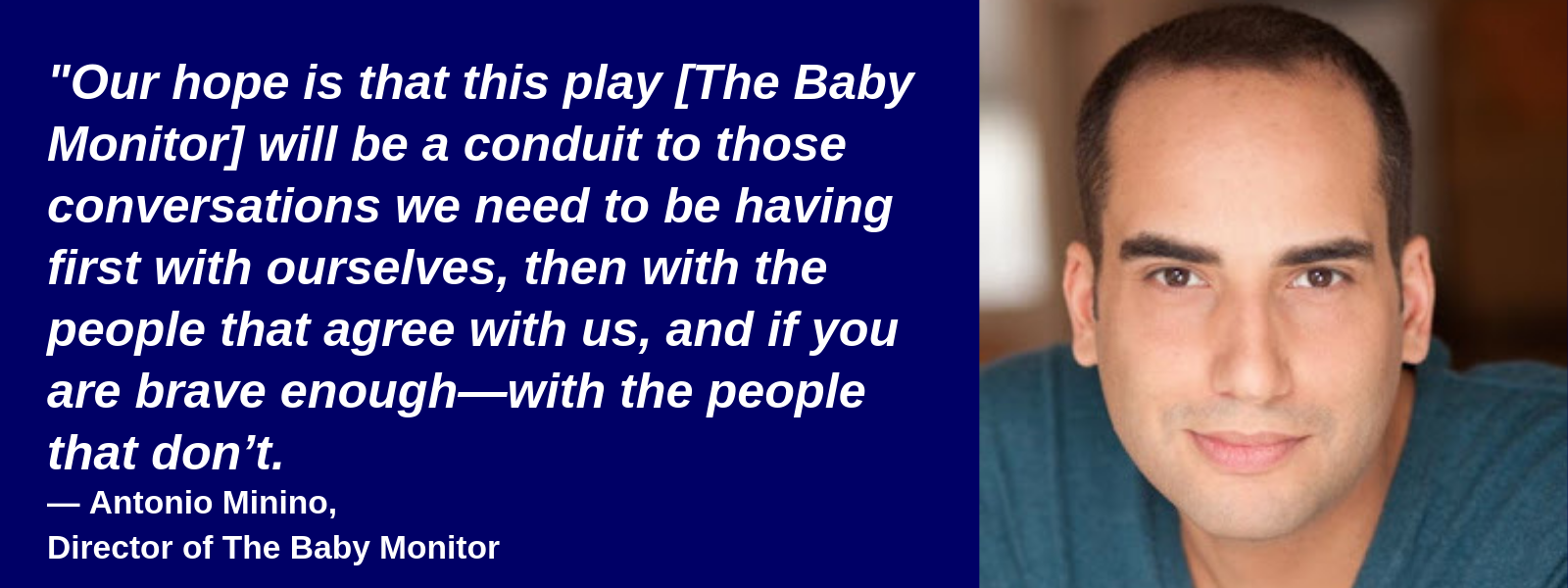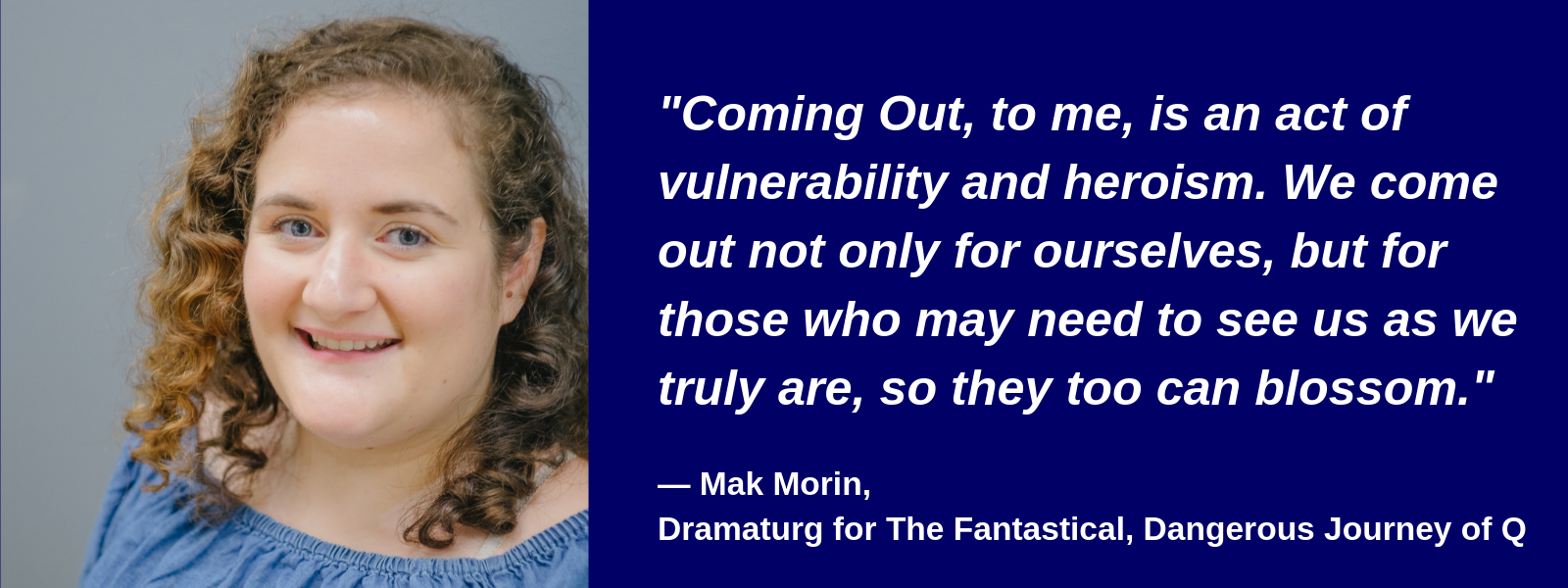In late November through mid-December, The Fantastical Dangerous Journey of Q—a Theater for Young Audiences Production—will run in repertory with The Baby Monitor, a play intended for Adult Audiences. Both plays have LGBTQ themes. In honor of National Coming Out Day, David Stallings, the Associate Artistic Director of the 14th Street Y spoke with LGBTQ artists involved with these plays. Mak Morin, Dramaturg for The Fantastical, Dangerous Journey of Q, and Antonio Minino, Director of The Baby Monitor, shared their thoughts and excitement about their plays and the importance of today.
What dialogue do you hope to have with our audiences on these themes? And why do you feel it important to address these themes to multiple age groups?
Mak: I feel like Theatre for Young Audiences is often really successful at bringing complicated themes back to their universal roots. Multiple age groups can not only enjoy a show like Q, but truly learn from the production’s sincerity in spreading not only awareness, but compassion and empathy. It’s not enough to have an emotional catharsis in the theatre, though that is an integral moment, we hope the dialogue surrounding identity, youth, and community that follows the show will help make space for non-binary, transgender, and gender non-conforming youth in our often hostile and inhospitable culture.
Antonio: Our country and our world are currently in a state of emergency, and we are no longer talking to each other. We are so angry, we are so hurt, that we think we have identified the “enemy”, and have stopped working on ourselves. We have fallen into the we-are-good-they-are-bad binary way of thinking and judging.
In the case of the United States, it is true the current administration is giving a platform to hate speech, but the speech is not new. The hate is not new. The tactic of identifying some as “other” and as less-than is not new. It’s been around since the land you stand on was stolen from the Indigenous people. That means we’ve all been subjected to this narrative at some point in our lives. It also means we have all been either subjected to it or perpetrators of it in some way. We’ve all been bigots to some degree at some point in our lives. We’ve all been racists (people of color included) to some degree at some point in our lives. We’ve all been homophobic (LGBTQ people included) to some degree at some point on our lives… and if you would say to me —“Antonio, I have never”— I wouldn’t believe you.
So for 100 minutes – within a safe space (The Theater at the 14th Street Y) – The Baby Monitor will force us to look at these uncomfortable truths. You will be exposed to the unconscious bias and ingrained prejudice that exist within a liberal identifying diverse cast of characters.
These are very hard topics to talk about around the dinner table. Our hope is that this play will be a conduit to those conversations we need to be having first with ourselves, then with the people that agree with us, and if you are brave enough—with the people that don’t. Our hope is that with this play you come out saying, “I thought I was woke, but I still need to work on myself… and if I still need to work on myself, why am I identifying as everyone I don’t agree with as a lost evil cause? Am I asking the right questions?” It’s never too young to have these conversations. However our production does have some partial nudity.

What does “National Coming Out Day” signify to you as an artist?
Mak: In my understanding, National Coming Out Day began as liberation of spirit and a celebration of self, with radical political intent. Because homophobia (and more) thrives in silence and ignorance, to authentically present your whole, undiluted self in the world remains a truly radical action, especially for LGBTQ persons. I don’t see my own identity as political, but I recognize that in our current climate, who I am inevitably comes up against who others want me to be for their own comfort. It is through the art of others that we might see ourselves reflected, or be ignited to a new state of being. And it is through our own art that we make ourselves vulnerable so others can find themselves in us, and be consoled. Coming Out, to me, is an act of vulnerability and heroism. We come out not only for ourselves, but for those who may need to see us as we truly are, so they too can blossom.
Antonio: I think it’s marvelous. Exposure leads to understanding. Which is what we are trying to do with The Baby Monitor.
Why is a story of identity important to all ages? Why is it relevant today?
Mak: There are so many LGBT persons in this world and our stories are all different, but even if someone has an entirely different story from my own, I feel invigorated hearing it. I feel so powerful and important knowing I can witness my community and they will, in turn, witness me. All ages can benefit from seeing a young person learning to embrace their identity despite all obstacles—cultural and emotional. It’s a journey we can all grow from, even if we aren’t the ones living it. I know my own coming out, slow and extremely cautious, had a profound effect on my own family. My mother, who owns a childcare center, began as skeptical and turned into a pioneer and activist for gender and sexuality equity in early childhood education. It is our hope that young people see themselves in Q and feel validated, but it is equally important to our team that those who don’t identify with Q can either grow or shift their perspective in a way that benefits the Q and Nixes of the world. Success for our show means facilitating an awakening of compassion that leads to progress not just in our society, but also in ourselves. True change begins with the people, and the greater breadth of people we have the opportunity to “meet” through the theatre, the greater our world and our empathy for each other grows.
Antonio: It’s important for people of all ages to be OK with redefining who they are and to continue searching for answers. This question and this search is relevant today because governments that are run by old white cisgender men are trying to tell us the progress we’ve made as a society in identifying and validating our differences is wrong. Don’t let them win.
What is your role in the production? On a personal note, how has collaborating on this piece nourished you artistically?
Mak: I started out as a consultant for the script when it was still being workshopped and polished for production. As a non-binary artist and writer, I knew from the moment I saw the staged reading that I belonged in the artistic pool of this piece. Something about it called out to me and I had to honor that voice—for it was both my own, and that of the communities I call home. Now, as the official Dramaturg for Q, the work has truly been rewarding, but above all it has been healing. Working with the Rebel Playhouse team, a dynamic group of people dedicated to doing Q’s story the utmost justice, has been an invigorating change of pace from other projects I’ve been a part of, where my identity and my input may have been more of a bane than a boon. With Rebel and Q I feel truly valued and inspired, and so very grateful to be a part of a piece that would have changed, explained, and healed so much of me when I was younger. The fact that I get the chance to make this for others now is so humbling and exciting!
Antonio: I’m honored to be directing this workshop. I’ve played the role of Phillip in a number of readings. It has been interesting to change roles. Any opportunity I have to work with my husband—who wrote the play—I take it. A lot of the themes addressed in this play are very personal. There’s a monologue in there about an event with my father that I still have a hard time listening to, but can’t imagine the character’s journey without it. I’m most amazed at how David captured the classist and colorist nature of the Dominican Republic…I guess I’ve spoken his ear off about it throughout the years. It’s also been fun to translate some text to Spanish and get very specific with the Dominican vernacular. Actress Laura Gómez has been instrumental in getting that just right. She’s been involved in many developmental readings of this play as well.
THE BABY MONITOR // theater
November 29 – December 16
Written by David Stallings, directed by Antonio Miniño
When Claire’s concerns over the welfare of her two-year old nephew are dangerously validated, she begins to question the family’s principals and ability to parent. A crucial new bilingual play, exploring same-sex parenting and cis family values in today’s America.
TICKETS
THE FANTASTICAL DANGEROUS JOURNEY OF Q // theater for young audiences
December 1 – 16
Written by Ric Averill, music by Dax Dupuy, directed & choreographed by Sarah Sutliff, music direction by Christina Bottley
Q, an upper elementary student struggling with gender and identity issues, faces the daily difficulties of preoccupied parents, bullying peers, and communication with challenging teachers… but with a bag of tricks everyday objects grow and are endowed with powers that allow Q to face larger than life threats head on! This new hour long musical features song, dance, and puppetry.
TICKETS


